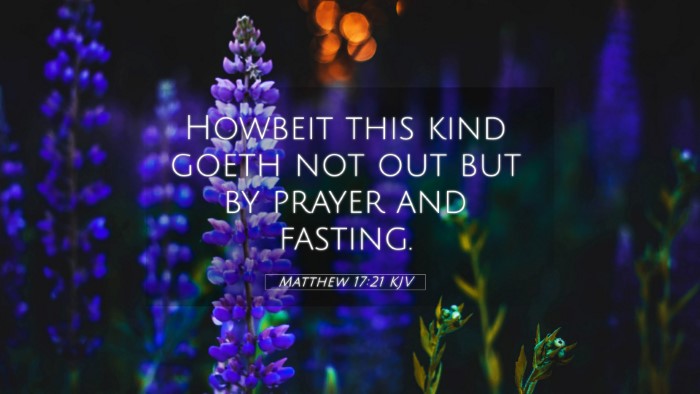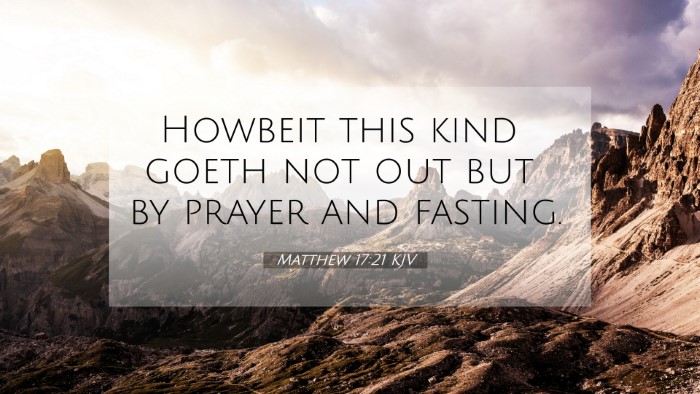Meaning of Matthew 17:21
Matthew 17:21 speaks to the necessity of prayer and fasting when facing particular challenges, particularly those related to spiritual authority, healing, and deliverance. This verse is often omitted in some translations; however, its significance remains potent in biblical exegesis and contextual analysis.
Insights from Public Domain Commentaries:
-
Matthew Henry: Henry emphasizes that the power of prayer must be paired with fasting, suggesting that certain adversities or demonic influences can only be overcome through a combination of sincere prayer and dedicated fasting. He notes that this requirement highlights the seriousness with which believers must approach their spiritual battles.
-
Albert Barnes: Barnes suggests that the phrase "this kind" implies that there are varying levels of spiritual challenges. He argues that fasting serves to humble the believer, creating a state of reliance on God rather than on one’s own strength. This verse, according to Barnes, illustrates a deeper interaction with God that enables one to confront formidable spiritual forces.
-
Adam Clarke: Clarke's interpretation acknowledges the traditional Jewish practice of fasting as a means of seeking divine intervention. He connects this verse to the broader understanding of the disciples’ failure to heal the boy prior to Jesus’ intervention, suggesting that their inability was due to a lack of preparation — specifically, insufficient prayer and fasting.
Cross References and Their Significance
Matthew 17:21 can be cross-referenced with several other Bible verses to enhance understanding and thematic analysis:
- Mark 9:29: "And he said unto them, This kind can come forth by nothing, but by prayer and fasting." - This verse echoes the message of Matthew 17:21, reinforcing the idea that some spiritual battles require dedicated prayer and fasting.
- Luke 18:1: "And he spake a parable unto them to this end, that men ought always to pray, and not to faint." - Highlights the importance of persistent prayer.
- James 5:16: "Confess your faults one to another, and pray one for another, that ye may be healed." - Shows the power of prayer in the community and personal healing.
- Isaiah 58:6: "Is not this the fast that I have chosen? To loose the bands of wickedness..." - Speaks to the purpose of fasting in addressing sin and seeking justice.
- Matthew 6:16-18: "Moreover when ye fast, be not, as the hypocrites, of a sad countenance..." - Advises on the proper attitude for fasting.
- Philippians 4:6: "Be careful for nothing; but in every thing by prayer and supplication with thanksgiving let your requests be made known unto God." - Encourages making all requests known through prayer.
- 2 Chronicles 20:3: "And Jehoshaphat feared, and set himself to seek the Lord, and proclaimed a fast throughout all Judah." - Illustrates fasting as a response to fear and seeking God’s help.
Thematic Connections
This verse touches on several themes prevalent throughout the Bible:
- Spiritual Authority: Understanding that some challenges require divine assistance through prayer.
- Humility and Repentance: Fasting serves as a means to humble oneself before God.
- Preparation: Preparedness in prayer and fasting before engaging in spiritual ministry.
- Community Support: The power of collective prayer and fasting among believers.
Practical Applications
Through Matthew 17:21, believers are encouraged to:
- Prioritize prayer and fasting when faced with significant spiritual challenges.
- Engage in personal and communal practices of fasting to draw closer to God.
- Seek a deeper understanding of their spiritual authority through consistent prayer.
- Utilize cross-referencing tools to study related verses for a holistic understanding of biblical guidance.
Additional Cross-Referencing Tools
To enhance your Bible study, consider using the following:
- Bible concordance
- Bible cross-reference guide
- Cross-reference Bible study methods
- Comprehensive Bible cross-reference materials


